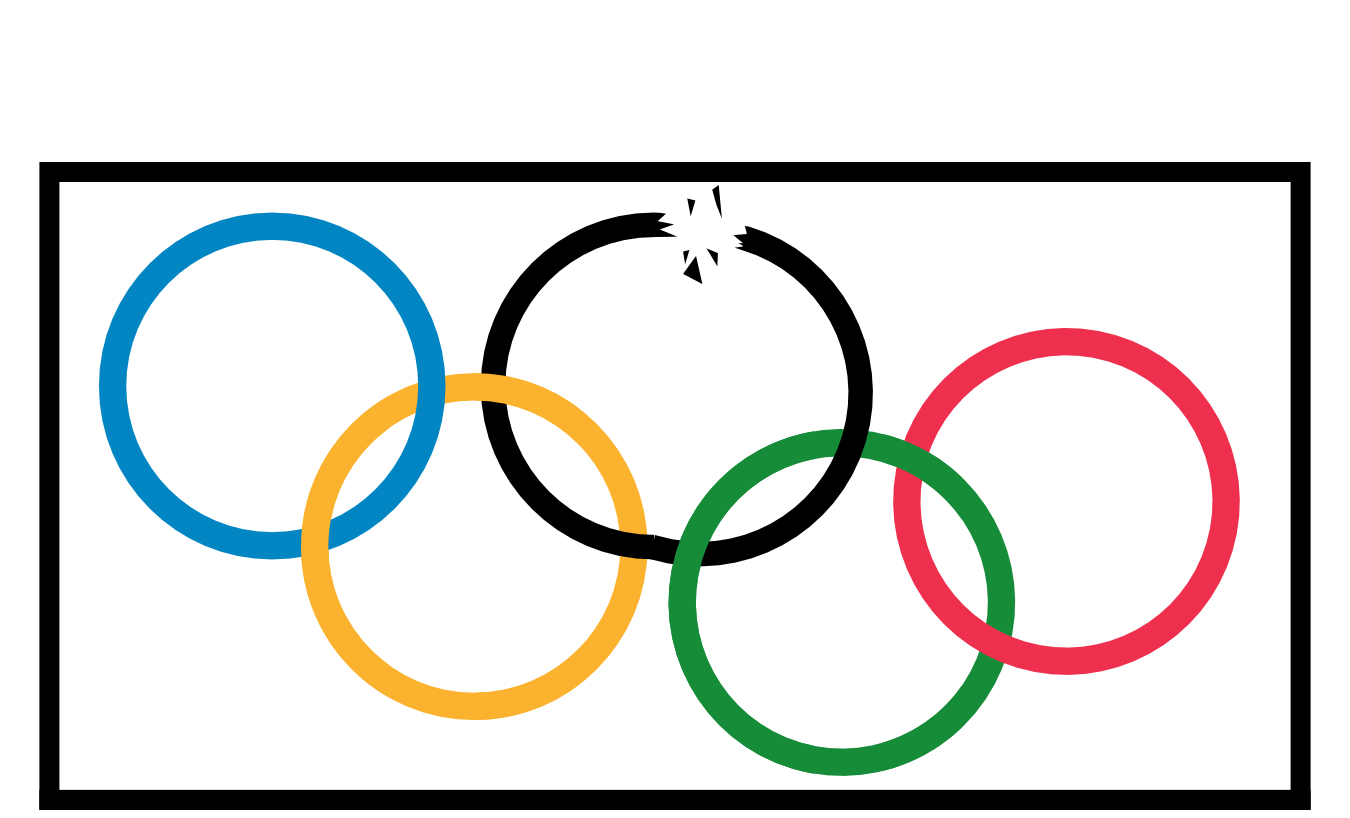
The Olympics is Broken. Let's fix it.
All data taken from the Rio 2016 Olympics unless stated otherwise.
Picture this: You’re an elite athlete, you’ve dedicated most of your life to your sport, worked harder than almost anyone else in the world to get where you are. Finally, you get your chance to compete in the Olympics. You’ve made it. After a tough competition, you get a silver medal and you’re proud. You’re currently the second best in the world at this event, an absolutely incredible achievement, and to be able to help your country win medals at an Olympic competition is a dream come true.
Well, throw away your sense of national pride, Olympian, according to the Olympic Medal Table you’ve done next to nothing in helping your country. You see, surprisingly, the Olympics medal table has a very similar opinion to Piers Morgan, in that, essentially, only gold medals counts. Say for example, country A achieved one gold, zero silver and zero bronze medals, and country B achieved zero gold, 20 silver and 20 bronze. Country A would finish above country B.
If I were the head of a major sporting country’s Olympic committee, my aim would be to make sure that my country was at the top of the medal table and to do that, it’s gold or nothing. To win the Olympics, you simply need the most gold medals. So, instead of trying to do well in all events, I will simply put all my effort (and money) into the sports with the most gold medals available.
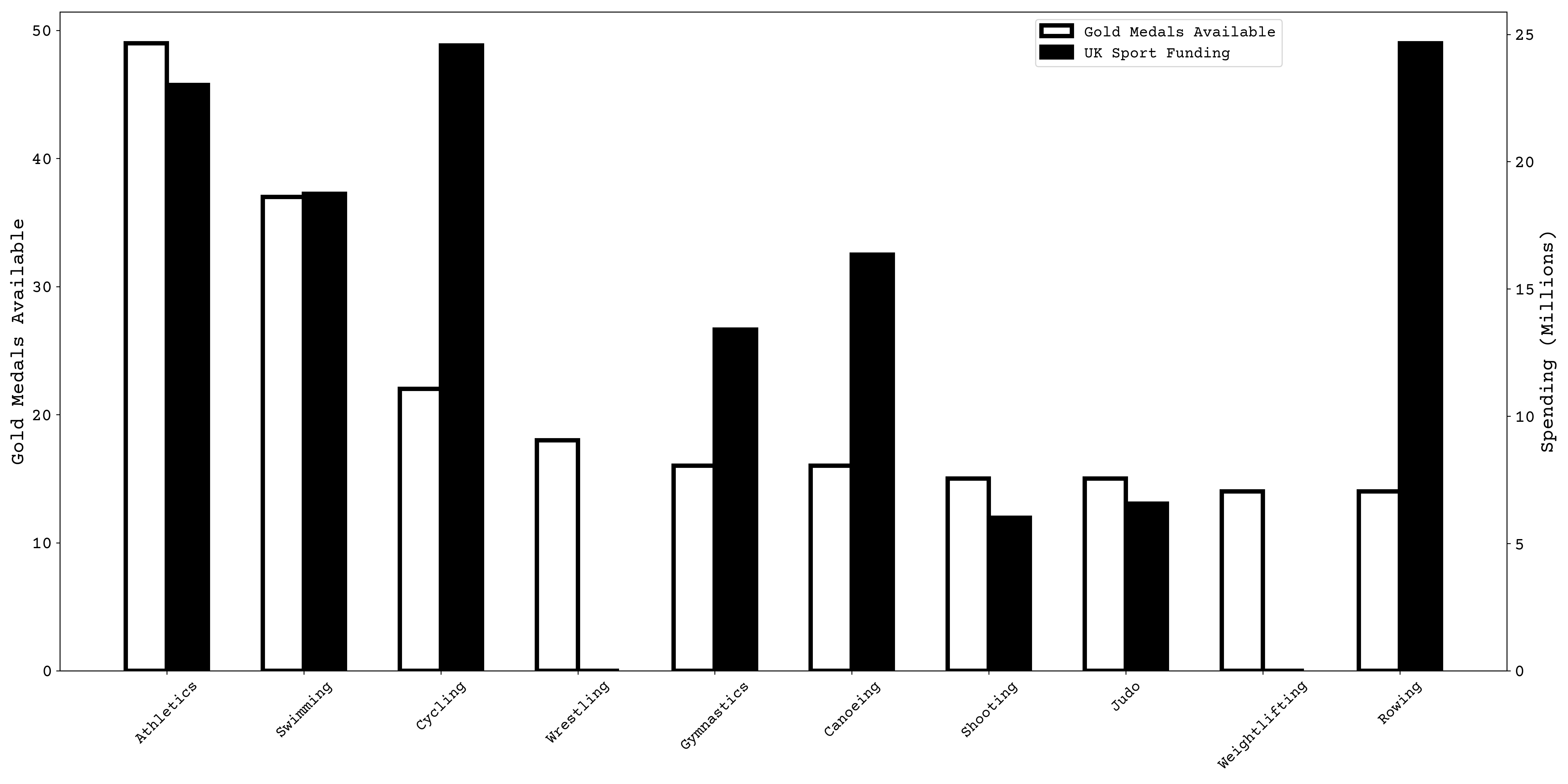 Top 10 Sports by Gold Medals Available, and UK Sport Funding (source).
Top 10 Sports by Gold Medals Available, and UK Sport Funding (source).
The way I see it, there are two problems with this method of Olympic scoring:
- Silver and bronze medals mean little to nothing for the medal table.
- Countries will put less resources and time in sports where fewer medals are on offer.
The Current Situation
As a country the tactic of funding and concentrating on sports with the most gold (while we can’t prove that it’s a tactic), does seem to work. Take for example the following graphs. First, you can see the number of gold medals up for grabs proportionaly for each sport, and second, you can see the proportion of gold medals won by the USA proportionaly to their total gold medal count in Rio 2016.
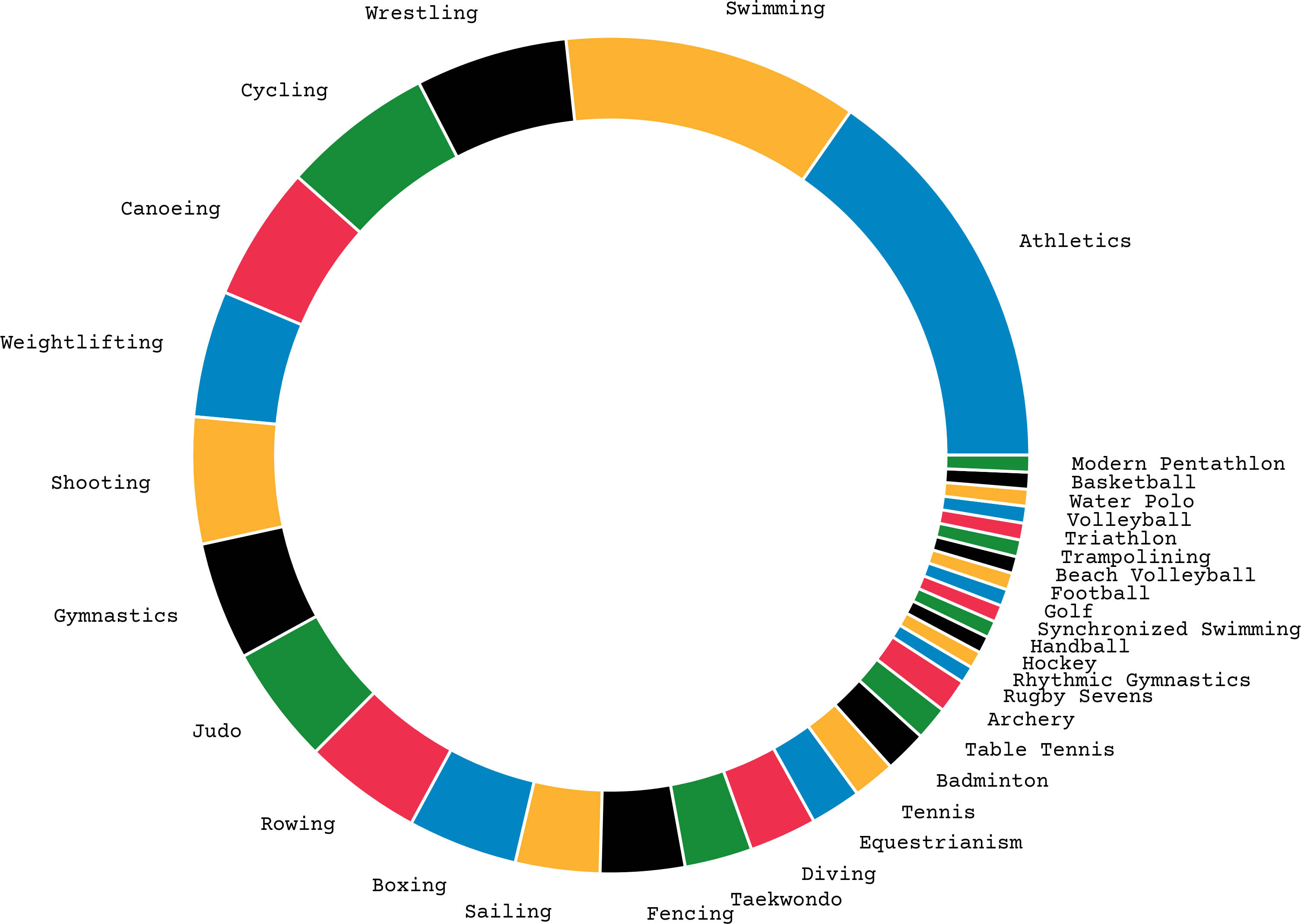
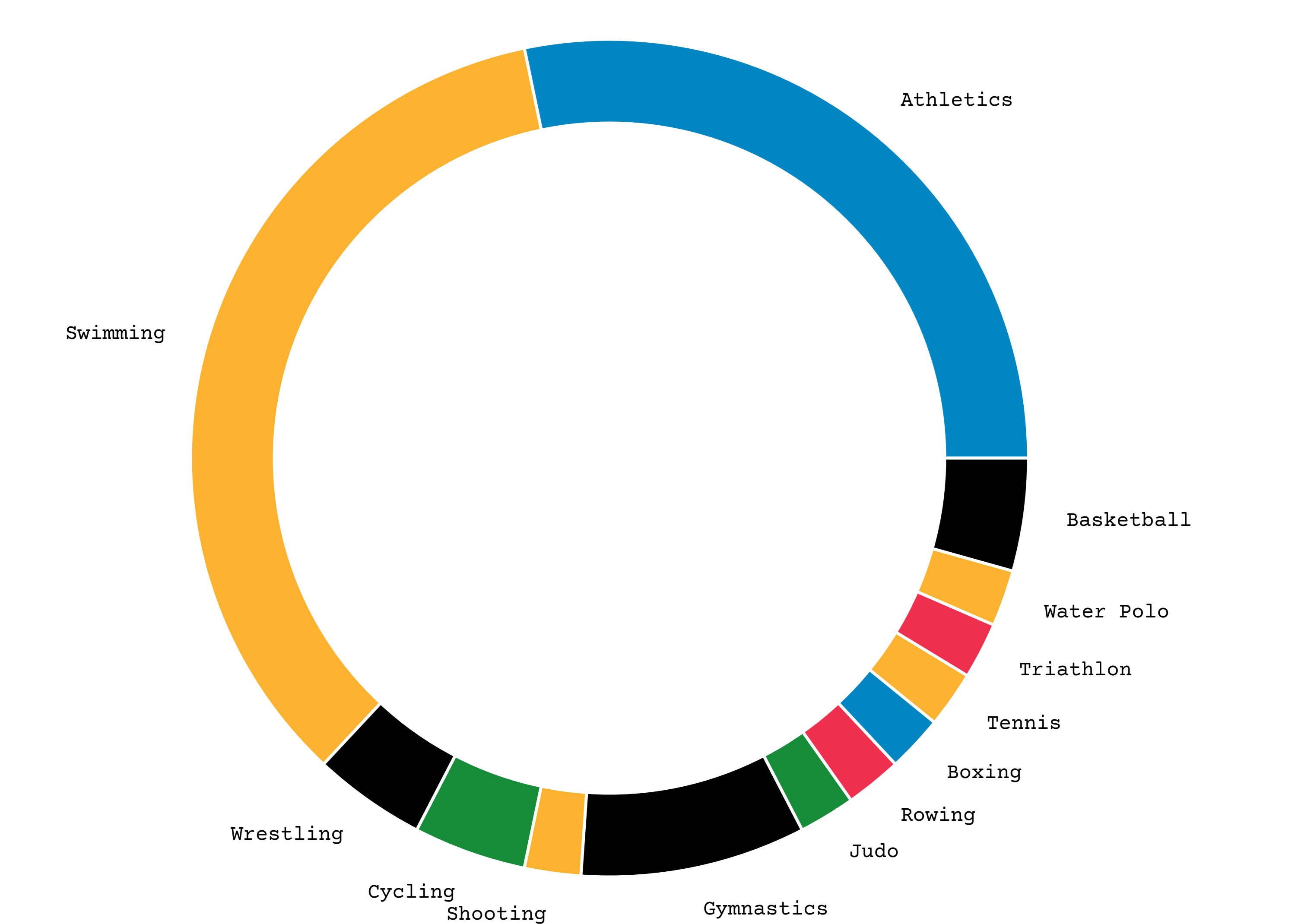 Top: Gold Medals Available. Bottom: USA Gold Medals Achieved in Rio 2016
Top: Gold Medals Available. Bottom: USA Gold Medals Achieved in Rio 2016
Now, no country is going to win proportionaly as many golds as there are on offer, that would mean winning nearly every gold medal. But just consider, 63% of the USAs winning medal count of 46 gold medals came from just 2 sports, athletics and swimming — the two sports with the most gold medals available. In fact, when we look at the USA’s medal count further, 86.96% (40/46) of all their medals came in the ten sports offering the highest number of gold medals, when these sports only account for 67.10% of the total gold medals available.
Let’s Fix It.
The first thing we want to fix is the fact that silver and bronze medals don’t mean much to the medal table. In our new system, the first point of call is to make silver and bronze medals worth something. Let’s assign a value to silver and bronze medals and create a ‘total’ score for each competing nation. It makes sense that gold medals should be worth the most, and so let’s just assign 0.5 to a silver medal, and 0.25 to a bronze medal. In other words, a silver is worth half a gold, and a bronze half a silver.
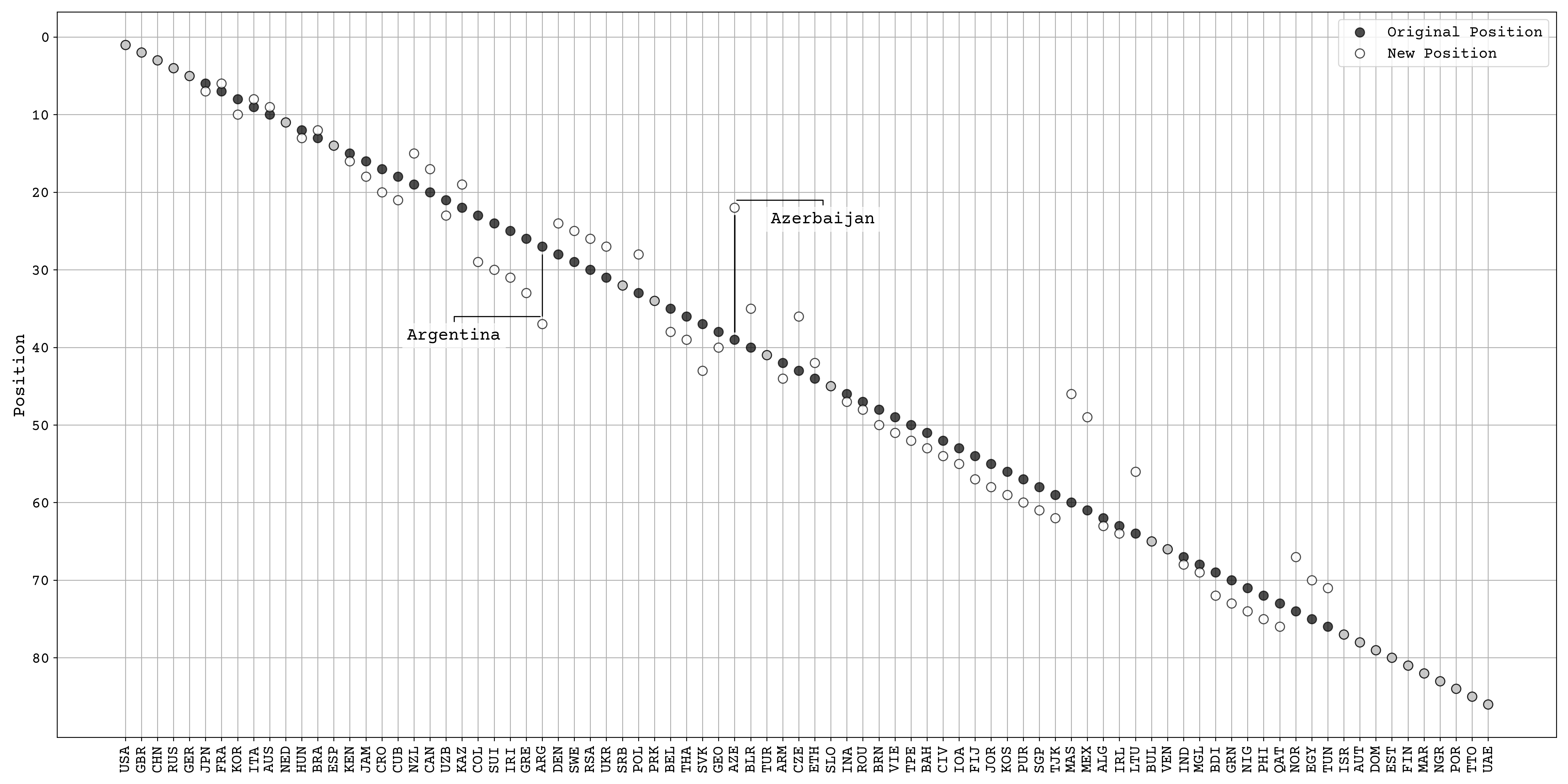 Change in Table Position, with Weighted Silver and Bronze Medals (Click for Full Screen).
Change in Table Position, with Weighted Silver and Bronze Medals (Click for Full Screen).
The biggest winners from this change are Azerbaijan, who gain 17 places. This simple change solves the first problem of teams with fewer silvers and bronzes being penalised too much. In the actual Olympic table, Azerbaijan earned a respectable one gold, seven silver and ten bronze medal haul at the Rio Olympics, but finished behind Georgia simply because they earned two gold medals.
| NOC | 🥇 Gold | 🥈 Silver | 🥉 Bronze | Total | |
|---|---|---|---|---|---|
| 37 | GEO | 2 | 1 | 4 | 7 |
| 38 | AZE | 1 | 7 | 10 | 18 |
Real Olympic Table Position of Azerbaijan and Georgia
Next is where the real changes happen. Let’s solve the problem of countries only concentrating on sports with more medals available. In this iteration, I have normalised each medal by the number of medals available in the given sport. For example, in athletics there are 47 gold medals available, and so each gold medal is worth just 1/47th of a gold medal. This should mean that countries with medals from a larger variety of sports are rewarded and this should show in their total. Let’s first arrange this new system in the same way that the Olympic medal table does, with medals sorted by number of golds.
| NOC | 🥉 Bronze | 🥈 Silver | 🥇 Gold | Previous Position | Change | |
|---|---|---|---|---|---|---|
| 1 | RUS | 1.59 | 1.73 | 4.11 | 4 | 3 |
| 2 | USA | 4.15 | 2.33 | 3.73 | 1 | -1 |
| 3 | CHN | 2.85 | 2.90 | 3.55 | 3 | 0 |
| 4 | GBR | 1.51 | 2.83 | 3.45 | 2 | -2 |
| 5 | GER | 2.62 | 1.80 | 2.10 | 5 | 0 |
| 6 | KOR | 0.87 | 0.21 | 1.92 | 8 | 2 |
| 7 | BRA | 0.29 | 0.83 | 1.77 | 13 | 6 |
| 8 | AUS | 0.82 | 0.63 | 1.32 | 10 | 2 |
| 9 | FRA | 0.76 | 2.70 | 0.96 | 7 | -2 |
| 10 | JPN | 2.49 | 0.57 | 0.84 | 6 | -4 |
Top 10 Olympic Positions after Weighted Medals Sorted by Golds
Russia take the most golds here, owing to their more diverse set of golds, and their golds coming from sports with fewer gold medals available. This doesn’t solve the problem of silvers and bronzes being irrelevant however, so we can combine the two techniques.
In this final iteration, we first normalise all medals, by making them worth a proportion of the total medals available in their respective sports, then, weigthing them as we did before; with silvers worth half, and bronze worth a quarter. With data from the above table where the USA earned 4.13 bronzes, we would take their weighted value of bronzes as 4.13 / 4 (because a bronze is worth a quarter of a gold) which is 1.03. Then, we sum up all their weighted and normalised medals to produce a value of their total, which will determine the order of the medal table.
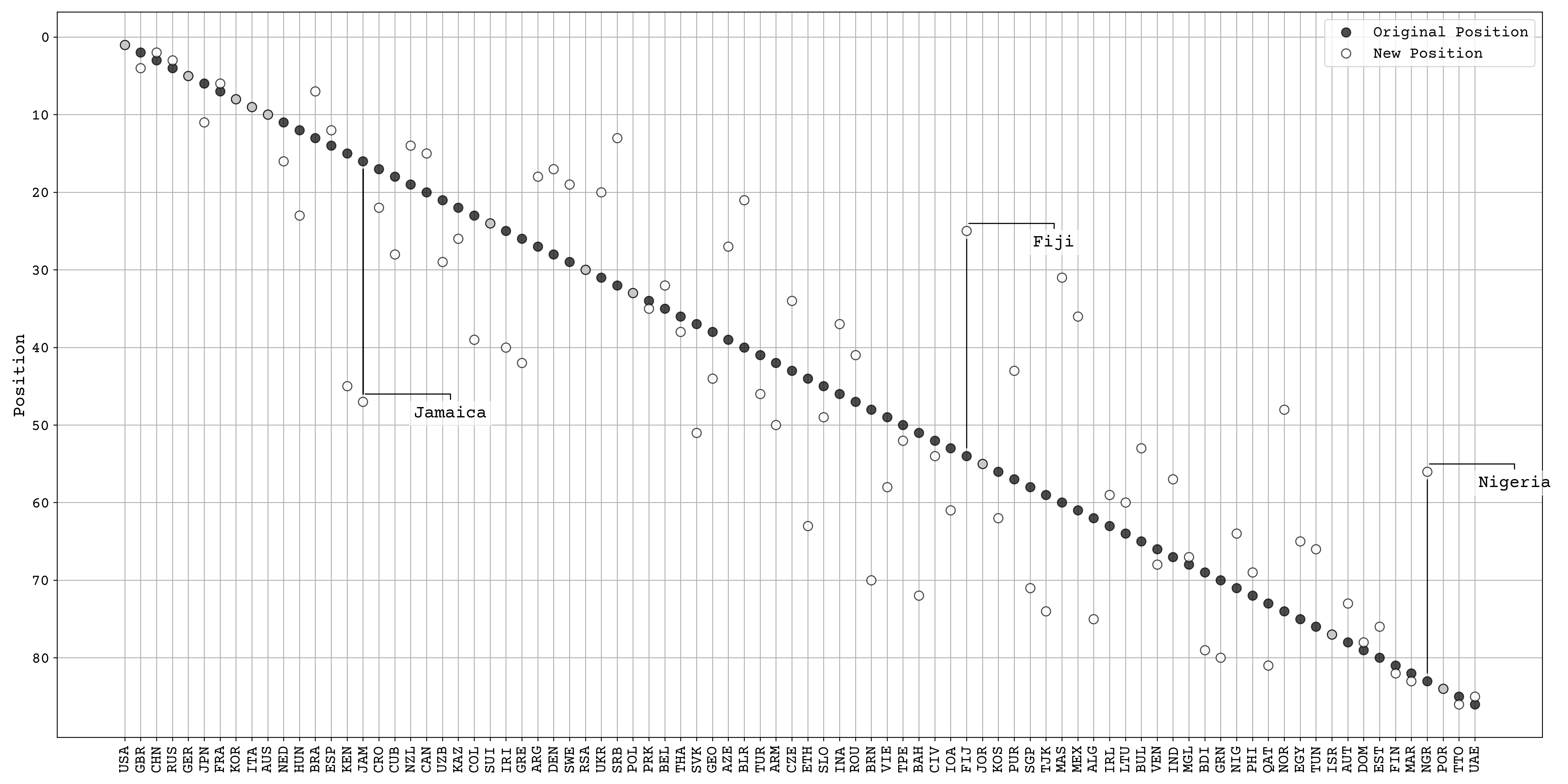 Change in Table Position with Normalised and Weighted Medals (Click for Full Screen).
Change in Table Position with Normalised and Weighted Medals (Click for Full Screen).
The biggest losers in this new method are Jamaica, dropping 31 places. When I saw this, I thought this was probably because Jamaica are specialists in athletics, and in our new scoring system we should reward generalists. I was proven right, all 21 of Jamaica’s medals, came from athletics.
The biggest gainers are the tiny island nation of Fiji. They won just one gold medal in Rugby 7s, where only two gold medals are available (men’s, and women’s). In this system, this means that their gold medal is worth 0.5 medals, and shoots them up past countries who may have earnt more medals. However, these countries’s medals will have come in sports where more medals were on offer. Fiji’s 0.5 total is enough to take them above Jamaica, whose six athletic golds are worth 6/47ths, three athletic silvers are worth 3/47 * 1/2, and two bronze are worth 2/47 * 1/4, which gives them a grand total of 0.17 medals. Nigeria also leap up the table, their one bronze medal is worth a lot more now, since it was won in football.
The Fiji Problem
By trying to solve the issue of countries concentrating on sports with more medals on offer, I have inadvertently created a new problem. Countries who win at the sports with the fewest medals available are now rewarded a bit too much. Meaning, if I wanted my country to win the Olympics, I would simply focus my resources, time, and money to produce the world’s best at rugby, tennis, modern pentathalon, and other sports with very few medals available. While this may not be ideal, often the sports with fewer medals take a larger amount of effort to win. For example, to win the gold medal for football at the olympics, you have to first qualify to play in the tournament before the Olympics begin, then participate in the group stage, followed by a knockout stage. The first match of the group stage usually takes place a couple of days before the Olympics opening ceremony, and the final usually takes place the day before the closing ceremony. Conversly, a gold medal in 50m freestyle swimming can take just 21.07 seconds, and if you are a good swimmer you can get a chance to win another gold medal in the 100m, taking 47.02 seconds! Obviously, to win a medal in Olympic freestyle simming is a major feat, taking a lifetime of intense training, and the amount of time taken to win a medal doesn’t devalue the accomplishment, but is it fair that it is worth the same as the gold medal in football which is essentially like winning a mini World Cup?
Conclusion
There is no easy solution to this problem that I believe the Olympics has with scoring. You may be of the opinion that only golds should matter, and it doesn’t matter that certain sports have more medals up for grabs. After all, athletics, for example, is one of the defining sports of the Olympics. While I think this may be true, to see countries with a large number of bronze and silver medals being penalised just because they won fewer golds than teams above them is not fair. I also do think that there should be some appreciation for the extended physical effort that certain sports require over other events. Perhaps in team events, there should be a gold medal for the number of players in the team? So football would be worth 11 Gold Medals, rather than one. But this doesn’t solve equivalent problems with tennis, for example.
Perhaps we wouldn’t need to solve “the Fiji problem”. Imagine an Olympics where the hardest faught battles were the “smaller” sports, where for the USA to win the Olympics they really needed to get the gold in modern pentathalon. Think also what good it would do for the popularity of these sports with fewer medals, for the great powerhouses of Olympic competition to pump resources into producing great athletes in them.
